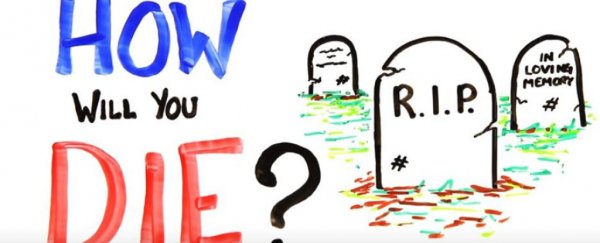
Let's face it - we're all gonna die, but statistically speaking, which way are we likely to go? Although most of us want our death to come quickly - in our sleep, and without knowing it - as the boys from AsapSCIENCE point out in the video above, you're probably not going to get that lucky.
But it's not all bad news. In just over last 100 years, the average human lifespan has increased from 31 years old, to 71, and developed nations on average live even longer.
And at the end of it all, there are plenty of weird ways to die.
You could end up like that one guy who died from heart failure after spending 50 hours straight playing StarCraft, or you could be like the 27 people last year who died of a 'selfie related accident' (but please don't – safe selfies are the best selfies).
You could even be one of the hundreds of people in Russia who die every year due to falling ice.
Those deaths would be fairly quick, at least - but what about the rest of us?
If we use the population of the US as our study group, there were 318 million people living in the States in 2014, and over 2.5 million of them died.
Now, here's the crappy bit: over half of these people died of heart disease or cancer – so statistically speaking - that might be how you go too.
The good news is that, 100 years ago, you'd be more likely to die of tuberculosis or influenza much earlier in life, so at least we have that to comfort ourselves with.
We can attribute this mostly to antibiotics and vaccines, which have been incredible for humans so far, but antibiotics are not having a great time at the moment, with superbugs and antibiotic resistance getting everyone more than a little concerned.
But, as asapSCIENCE explains in the video above, we've even been able to decrease our risk of dying from cancer, even if a cure still eludes us.
In the 1970s, the average survival rate from cancer was about 50 percent, but today, you're looking at a 68 percent chance of beating cancer, and there are 15.5 million cancer survivors alive in the US today to prove it.
We'll let the video explain accidental or sudden deaths, which asapSCIENCE says over 136,000 people died of in the US alone in 2014.
All we'll say is that maybe we don't need to be quite so scared of sharks.
